Analyzing Catholic Social Thought: Self, Community, and Key Principles
VerifiedAdded on 2023/04/08
|6
|1137
|158
Essay
AI Summary
This essay delves into five key principles of Catholic Social Thought (CST): the life and dignity of the human person, the common good, the correlation between rights and responsibilities, the preferential option for the poor and vulnerable, and stewardship and care for creation. It explains how each principle contributes to a better understanding of oneself and one's role within the community. The essay highlights that CST provides a framework for living responsibly and building a just society by emphasizing social responsibility and interconnectedness, arguing that by following these principles, individuals can foster personal growth while contributing to the well-being of the broader community and promoting social awareness.
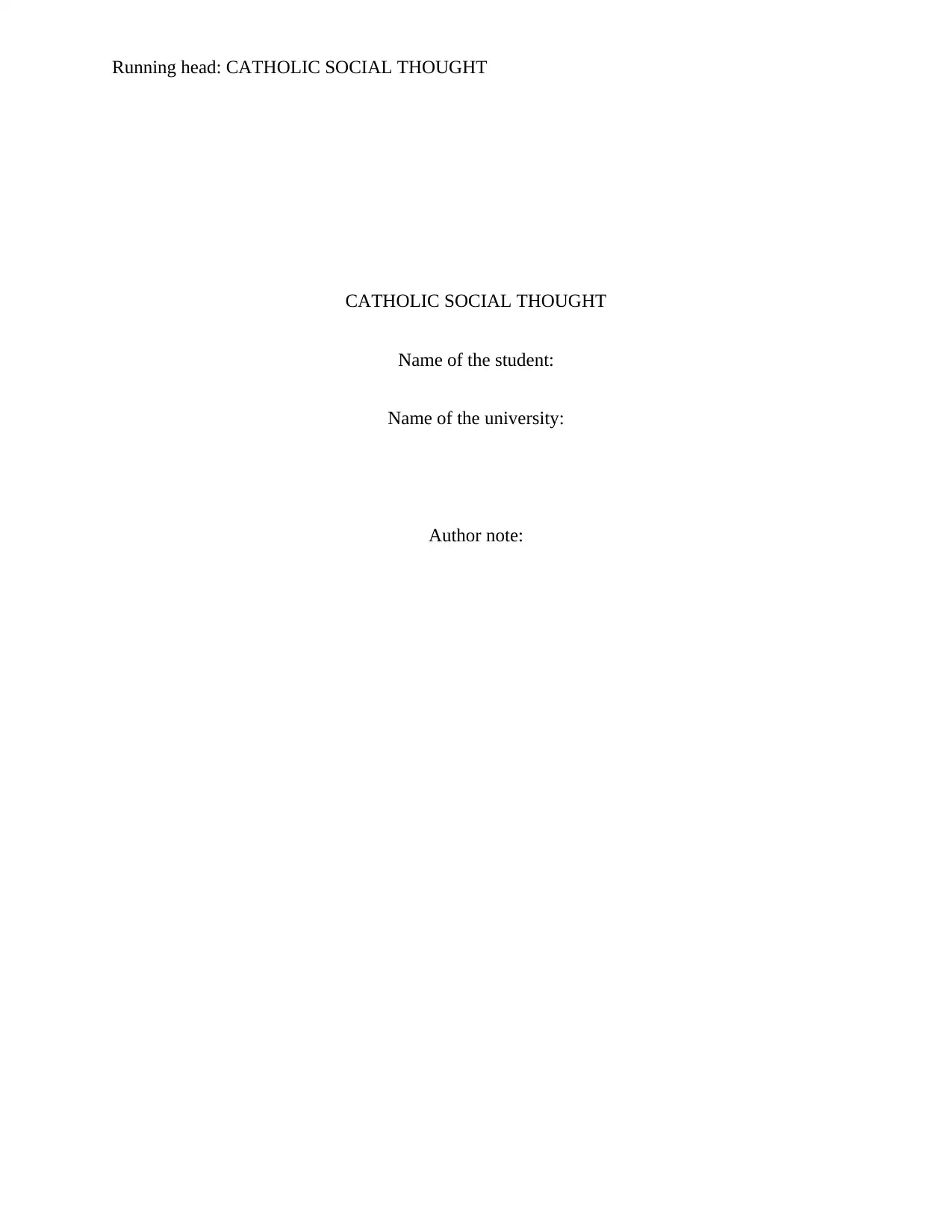
Running head: CATHOLIC SOCIAL THOUGHT
CATHOLIC SOCIAL THOUGHT
Name of the student:
Name of the university:
Author note:
CATHOLIC SOCIAL THOUGHT
Name of the student:
Name of the university:
Author note:
Paraphrase This Document
Need a fresh take? Get an instant paraphrase of this document with our AI Paraphraser
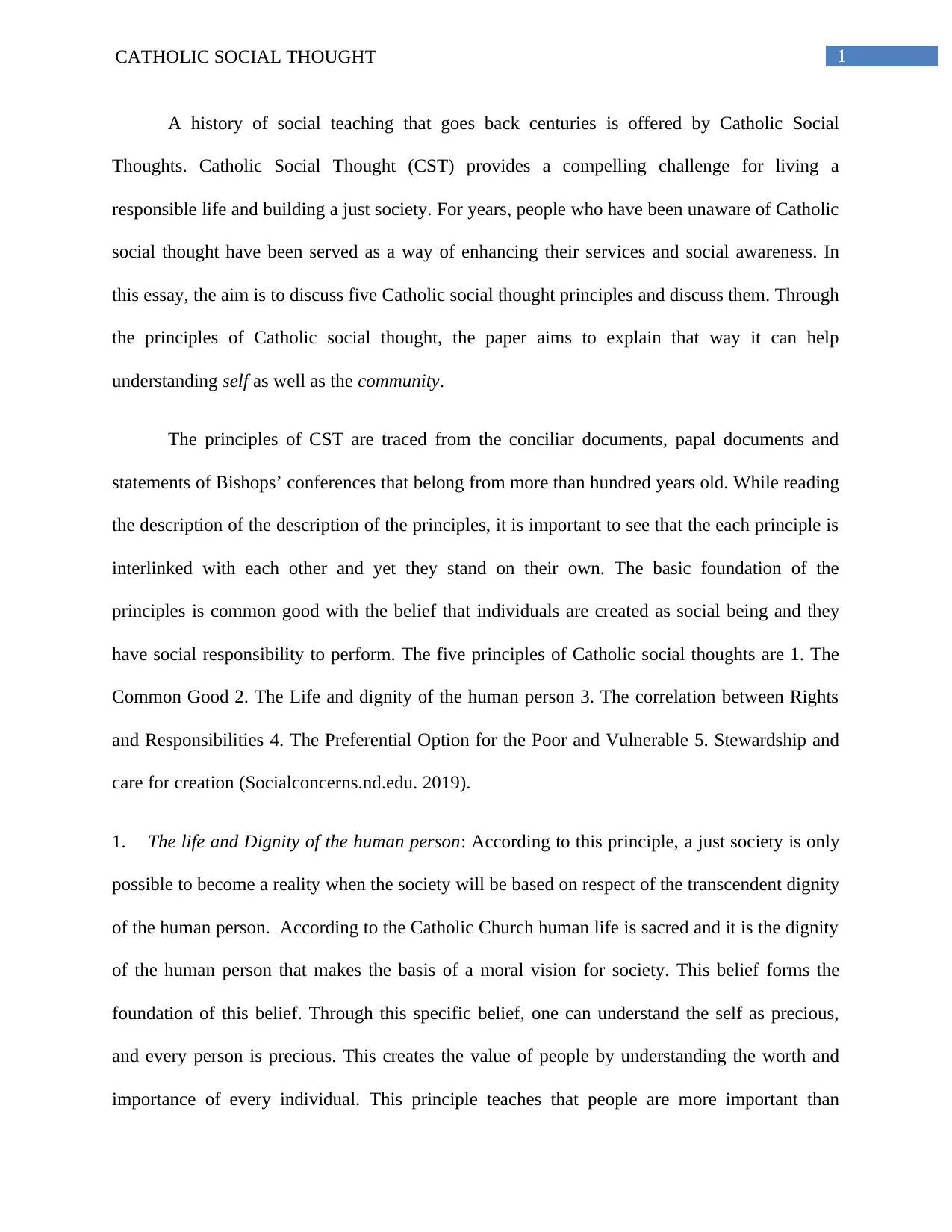
1CATHOLIC SOCIAL THOUGHT
A history of social teaching that goes back centuries is offered by Catholic Social
Thoughts. Catholic Social Thought (CST) provides a compelling challenge for living a
responsible life and building a just society. For years, people who have been unaware of Catholic
social thought have been served as a way of enhancing their services and social awareness. In
this essay, the aim is to discuss five Catholic social thought principles and discuss them. Through
the principles of Catholic social thought, the paper aims to explain that way it can help
understanding self as well as the community.
The principles of CST are traced from the conciliar documents, papal documents and
statements of Bishops’ conferences that belong from more than hundred years old. While reading
the description of the description of the principles, it is important to see that the each principle is
interlinked with each other and yet they stand on their own. The basic foundation of the
principles is common good with the belief that individuals are created as social being and they
have social responsibility to perform. The five principles of Catholic social thoughts are 1. The
Common Good 2. The Life and dignity of the human person 3. The correlation between Rights
and Responsibilities 4. The Preferential Option for the Poor and Vulnerable 5. Stewardship and
care for creation (Socialconcerns.nd.edu. 2019).
1. The life and Dignity of the human person: According to this principle, a just society is only
possible to become a reality when the society will be based on respect of the transcendent dignity
of the human person. According to the Catholic Church human life is sacred and it is the dignity
of the human person that makes the basis of a moral vision for society. This belief forms the
foundation of this belief. Through this specific belief, one can understand the self as precious,
and every person is precious. This creates the value of people by understanding the worth and
importance of every individual. This principle teaches that people are more important than
A history of social teaching that goes back centuries is offered by Catholic Social
Thoughts. Catholic Social Thought (CST) provides a compelling challenge for living a
responsible life and building a just society. For years, people who have been unaware of Catholic
social thought have been served as a way of enhancing their services and social awareness. In
this essay, the aim is to discuss five Catholic social thought principles and discuss them. Through
the principles of Catholic social thought, the paper aims to explain that way it can help
understanding self as well as the community.
The principles of CST are traced from the conciliar documents, papal documents and
statements of Bishops’ conferences that belong from more than hundred years old. While reading
the description of the description of the principles, it is important to see that the each principle is
interlinked with each other and yet they stand on their own. The basic foundation of the
principles is common good with the belief that individuals are created as social being and they
have social responsibility to perform. The five principles of Catholic social thoughts are 1. The
Common Good 2. The Life and dignity of the human person 3. The correlation between Rights
and Responsibilities 4. The Preferential Option for the Poor and Vulnerable 5. Stewardship and
care for creation (Socialconcerns.nd.edu. 2019).
1. The life and Dignity of the human person: According to this principle, a just society is only
possible to become a reality when the society will be based on respect of the transcendent dignity
of the human person. According to the Catholic Church human life is sacred and it is the dignity
of the human person that makes the basis of a moral vision for society. This belief forms the
foundation of this belief. Through this specific belief, one can understand the self as precious,
and every person is precious. This creates the value of people by understanding the worth and
importance of every individual. This principle teaches that people are more important than
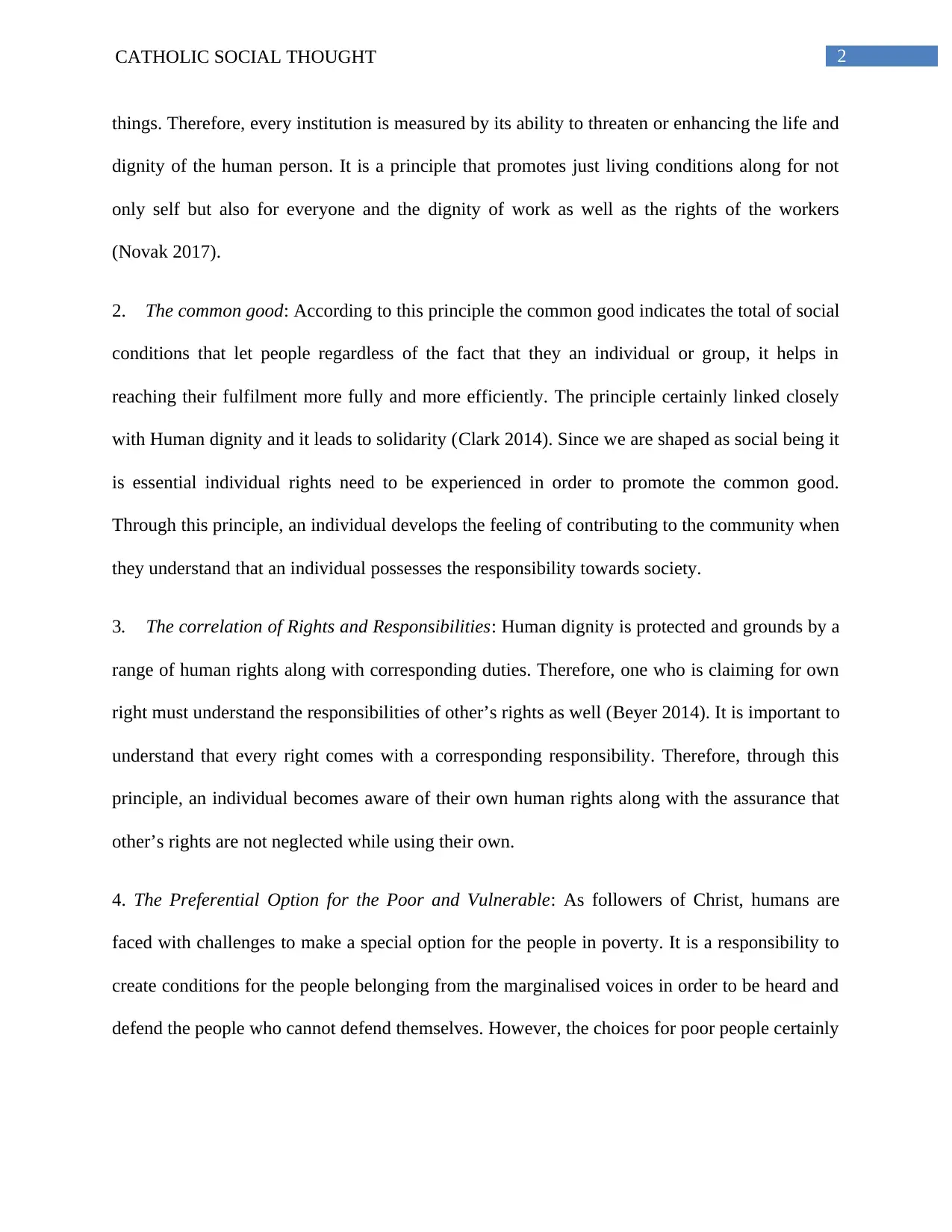
2CATHOLIC SOCIAL THOUGHT
things. Therefore, every institution is measured by its ability to threaten or enhancing the life and
dignity of the human person. It is a principle that promotes just living conditions along for not
only self but also for everyone and the dignity of work as well as the rights of the workers
(Novak 2017).
2. The common good: According to this principle the common good indicates the total of social
conditions that let people regardless of the fact that they an individual or group, it helps in
reaching their fulfilment more fully and more efficiently. The principle certainly linked closely
with Human dignity and it leads to solidarity (Clark 2014). Since we are shaped as social being it
is essential individual rights need to be experienced in order to promote the common good.
Through this principle, an individual develops the feeling of contributing to the community when
they understand that an individual possesses the responsibility towards society.
3. The correlation of Rights and Responsibilities: Human dignity is protected and grounds by a
range of human rights along with corresponding duties. Therefore, one who is claiming for own
right must understand the responsibilities of other’s rights as well (Beyer 2014). It is important to
understand that every right comes with a corresponding responsibility. Therefore, through this
principle, an individual becomes aware of their own human rights along with the assurance that
other’s rights are not neglected while using their own.
4. The Preferential Option for the Poor and Vulnerable: As followers of Christ, humans are
faced with challenges to make a special option for the people in poverty. It is a responsibility to
create conditions for the people belonging from the marginalised voices in order to be heard and
defend the people who cannot defend themselves. However, the choices for poor people certainly
things. Therefore, every institution is measured by its ability to threaten or enhancing the life and
dignity of the human person. It is a principle that promotes just living conditions along for not
only self but also for everyone and the dignity of work as well as the rights of the workers
(Novak 2017).
2. The common good: According to this principle the common good indicates the total of social
conditions that let people regardless of the fact that they an individual or group, it helps in
reaching their fulfilment more fully and more efficiently. The principle certainly linked closely
with Human dignity and it leads to solidarity (Clark 2014). Since we are shaped as social being it
is essential individual rights need to be experienced in order to promote the common good.
Through this principle, an individual develops the feeling of contributing to the community when
they understand that an individual possesses the responsibility towards society.
3. The correlation of Rights and Responsibilities: Human dignity is protected and grounds by a
range of human rights along with corresponding duties. Therefore, one who is claiming for own
right must understand the responsibilities of other’s rights as well (Beyer 2014). It is important to
understand that every right comes with a corresponding responsibility. Therefore, through this
principle, an individual becomes aware of their own human rights along with the assurance that
other’s rights are not neglected while using their own.
4. The Preferential Option for the Poor and Vulnerable: As followers of Christ, humans are
faced with challenges to make a special option for the people in poverty. It is a responsibility to
create conditions for the people belonging from the marginalised voices in order to be heard and
defend the people who cannot defend themselves. However, the choices for poor people certainly
⊘ This is a preview!⊘
Do you want full access?
Subscribe today to unlock all pages.

Trusted by 1+ million students worldwide
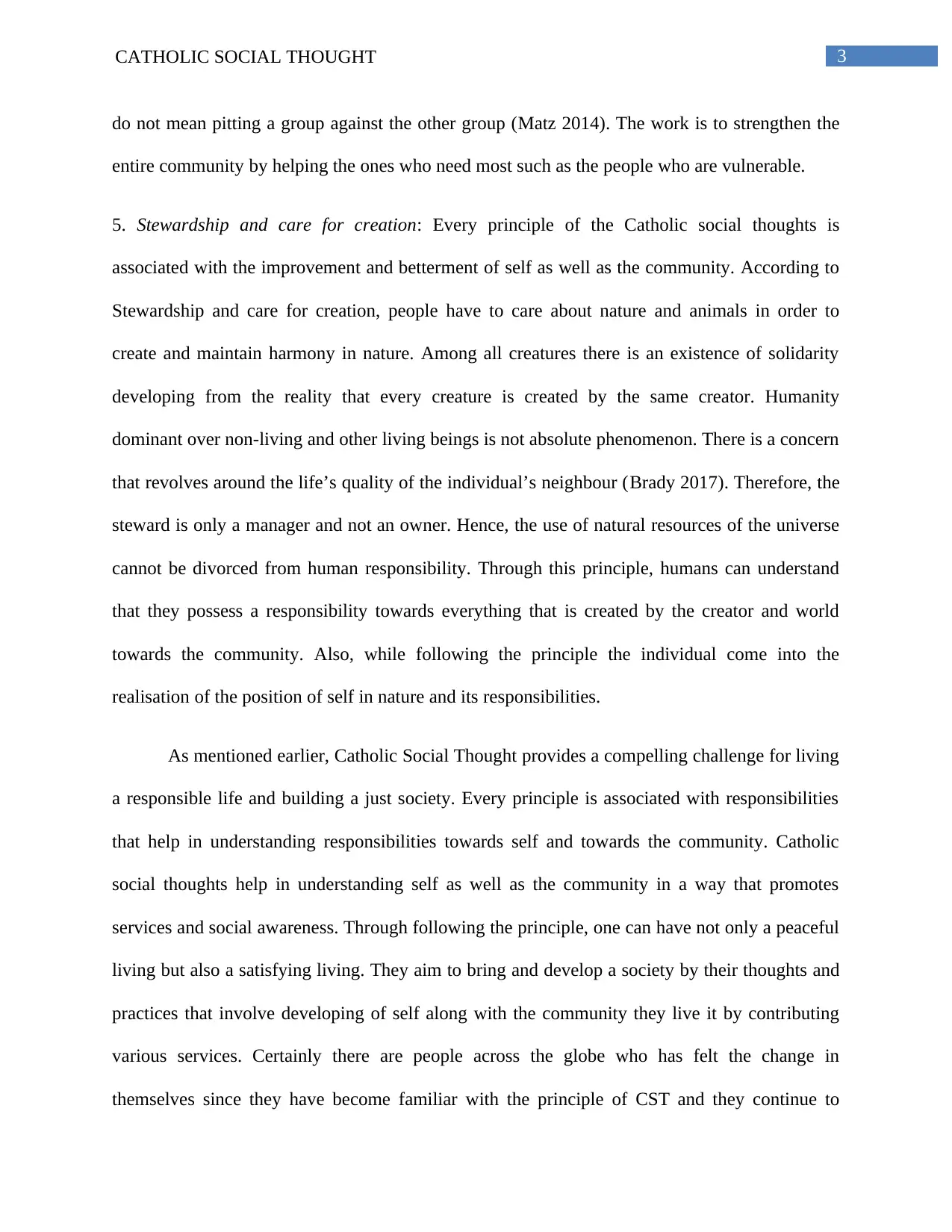
3CATHOLIC SOCIAL THOUGHT
do not mean pitting a group against the other group (Matz 2014). The work is to strengthen the
entire community by helping the ones who need most such as the people who are vulnerable.
5. Stewardship and care for creation: Every principle of the Catholic social thoughts is
associated with the improvement and betterment of self as well as the community. According to
Stewardship and care for creation, people have to care about nature and animals in order to
create and maintain harmony in nature. Among all creatures there is an existence of solidarity
developing from the reality that every creature is created by the same creator. Humanity
dominant over non-living and other living beings is not absolute phenomenon. There is a concern
that revolves around the life’s quality of the individual’s neighbour (Brady 2017). Therefore, the
steward is only a manager and not an owner. Hence, the use of natural resources of the universe
cannot be divorced from human responsibility. Through this principle, humans can understand
that they possess a responsibility towards everything that is created by the creator and world
towards the community. Also, while following the principle the individual come into the
realisation of the position of self in nature and its responsibilities.
As mentioned earlier, Catholic Social Thought provides a compelling challenge for living
a responsible life and building a just society. Every principle is associated with responsibilities
that help in understanding responsibilities towards self and towards the community. Catholic
social thoughts help in understanding self as well as the community in a way that promotes
services and social awareness. Through following the principle, one can have not only a peaceful
living but also a satisfying living. They aim to bring and develop a society by their thoughts and
practices that involve developing of self along with the community they live it by contributing
various services. Certainly there are people across the globe who has felt the change in
themselves since they have become familiar with the principle of CST and they continue to
do not mean pitting a group against the other group (Matz 2014). The work is to strengthen the
entire community by helping the ones who need most such as the people who are vulnerable.
5. Stewardship and care for creation: Every principle of the Catholic social thoughts is
associated with the improvement and betterment of self as well as the community. According to
Stewardship and care for creation, people have to care about nature and animals in order to
create and maintain harmony in nature. Among all creatures there is an existence of solidarity
developing from the reality that every creature is created by the same creator. Humanity
dominant over non-living and other living beings is not absolute phenomenon. There is a concern
that revolves around the life’s quality of the individual’s neighbour (Brady 2017). Therefore, the
steward is only a manager and not an owner. Hence, the use of natural resources of the universe
cannot be divorced from human responsibility. Through this principle, humans can understand
that they possess a responsibility towards everything that is created by the creator and world
towards the community. Also, while following the principle the individual come into the
realisation of the position of self in nature and its responsibilities.
As mentioned earlier, Catholic Social Thought provides a compelling challenge for living
a responsible life and building a just society. Every principle is associated with responsibilities
that help in understanding responsibilities towards self and towards the community. Catholic
social thoughts help in understanding self as well as the community in a way that promotes
services and social awareness. Through following the principle, one can have not only a peaceful
living but also a satisfying living. They aim to bring and develop a society by their thoughts and
practices that involve developing of self along with the community they live it by contributing
various services. Certainly there are people across the globe who has felt the change in
themselves since they have become familiar with the principle of CST and they continue to
Paraphrase This Document
Need a fresh take? Get an instant paraphrase of this document with our AI Paraphraser

4CATHOLIC SOCIAL THOUGHT
promote the incorporation of Catholic social thought through their various programs and courses
in a proactive way.
promote the incorporation of Catholic social thought through their various programs and courses
in a proactive way.
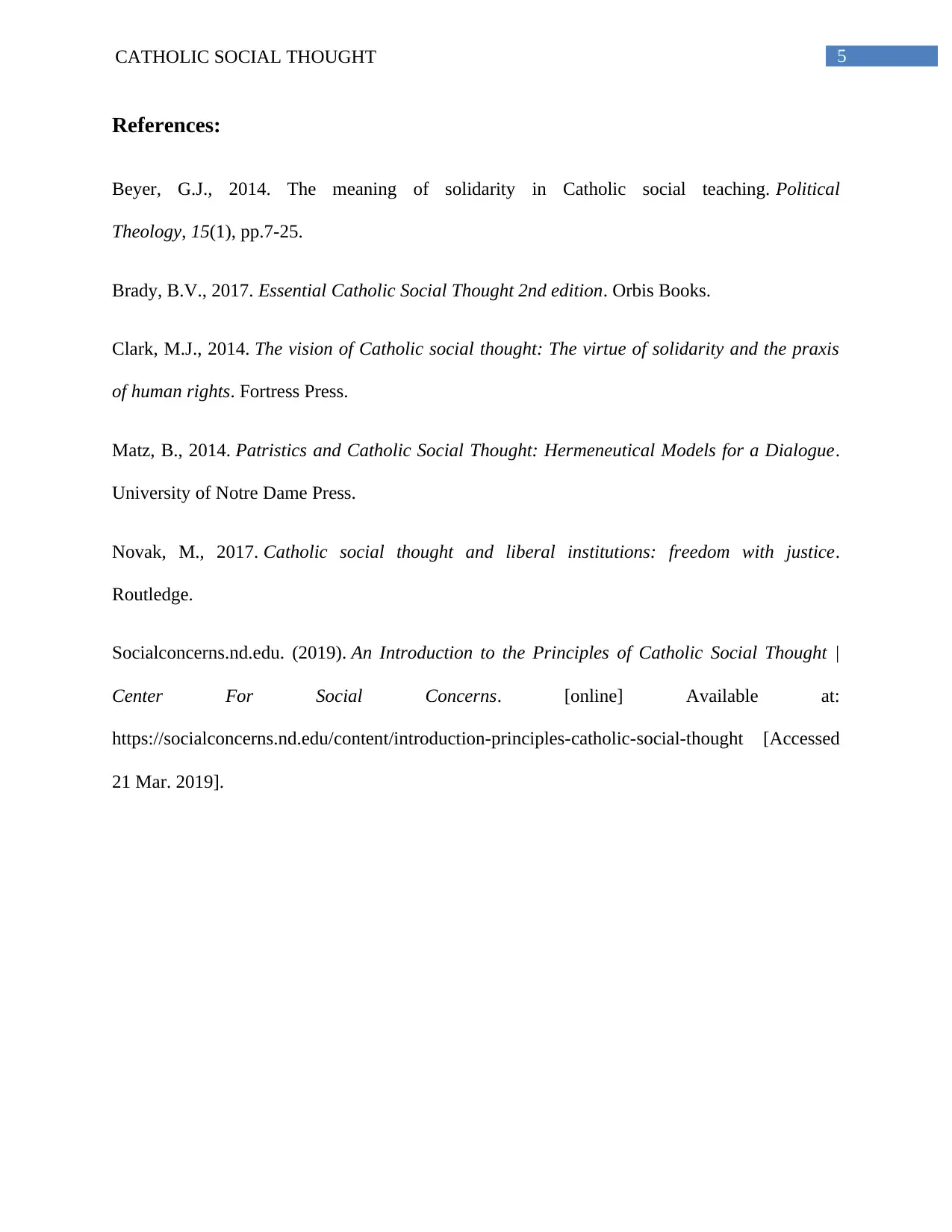
5CATHOLIC SOCIAL THOUGHT
References:
Beyer, G.J., 2014. The meaning of solidarity in Catholic social teaching. Political
Theology, 15(1), pp.7-25.
Brady, B.V., 2017. Essential Catholic Social Thought 2nd edition. Orbis Books.
Clark, M.J., 2014. The vision of Catholic social thought: The virtue of solidarity and the praxis
of human rights. Fortress Press.
Matz, B., 2014. Patristics and Catholic Social Thought: Hermeneutical Models for a Dialogue.
University of Notre Dame Press.
Novak, M., 2017. Catholic social thought and liberal institutions: freedom with justice.
Routledge.
Socialconcerns.nd.edu. (2019). An Introduction to the Principles of Catholic Social Thought |
Center For Social Concerns. [online] Available at:
https://socialconcerns.nd.edu/content/introduction-principles-catholic-social-thought [Accessed
21 Mar. 2019].
References:
Beyer, G.J., 2014. The meaning of solidarity in Catholic social teaching. Political
Theology, 15(1), pp.7-25.
Brady, B.V., 2017. Essential Catholic Social Thought 2nd edition. Orbis Books.
Clark, M.J., 2014. The vision of Catholic social thought: The virtue of solidarity and the praxis
of human rights. Fortress Press.
Matz, B., 2014. Patristics and Catholic Social Thought: Hermeneutical Models for a Dialogue.
University of Notre Dame Press.
Novak, M., 2017. Catholic social thought and liberal institutions: freedom with justice.
Routledge.
Socialconcerns.nd.edu. (2019). An Introduction to the Principles of Catholic Social Thought |
Center For Social Concerns. [online] Available at:
https://socialconcerns.nd.edu/content/introduction-principles-catholic-social-thought [Accessed
21 Mar. 2019].
⊘ This is a preview!⊘
Do you want full access?
Subscribe today to unlock all pages.

Trusted by 1+ million students worldwide
1 out of 6
Related Documents
Your All-in-One AI-Powered Toolkit for Academic Success.
+13062052269
info@desklib.com
Available 24*7 on WhatsApp / Email
![[object Object]](/_next/static/media/star-bottom.7253800d.svg)
Unlock your academic potential
Copyright © 2020–2026 A2Z Services. All Rights Reserved. Developed and managed by ZUCOL.



